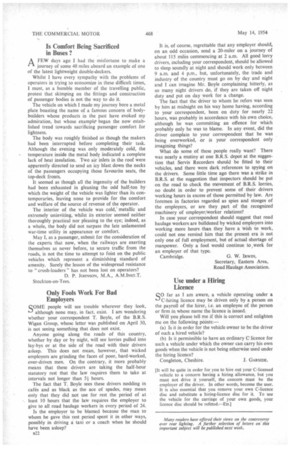Is Comfort Being Sacrificed in Buses ?
Page 56

If you've noticed an error in this article please click here to report it so we can fix it.
AFEW days ago I had the misfortune to make a journey of some 40 miles aboard an example of one of the latest lightweight double-deckers.
Whilst 1 have every sympathy with the problems of operators in trying to economize in these difficult times, 1 must, as a humble member of the travelling public, protest that skimping on the fittings and construction of passenger bodies is not the way to do it.
The vehicle on which 1 made my journey bore a metal plate boasting the name of a famous concern of bodybuilders whose products in the past have evoked my admiration, but whose example% began the now established trend towards sacrificing passenger comfort for lightness.
The body was roughly finished as though the makers had been interrupted before completing their task. Although the evening was only moderately cold, the temperature inside the metal body indicated a complete lack of heat insulation. Two air inlets in the roof were apparently directed to send an icy blast down the necks of the passengers occupying those favourite seats, the top-deck fronts.
It seemed as though all the ingenuity of the builders
had been exhausted in gleaning the odd half:ton by which the weight of the vehicle was lighter than its contemporaries, leaving none to provide for the comfort and welfare of the source of revenue of the operator.
The interior of the vehicle was cold: metallic and extremely uninviting, whilst its exterior seemed neither thoroughly practical nor pleasing to the eye; indeed, as a whole, the body did not surpass the late unlamented war-time utility in appearance or comfort.
May I, as a passenger, submit for the consideration of the experts that now, when the railways are exerting themselves as never before, to secure traffic from the roads, is not the time to attempt to foist on the public vehicles which represent a diminishing standard of amenity. Surely the lesson of the widespread resistance to " crush-loaders " has not been lost on operators?
D. P. JOHNSON, M.A., A.M.INsT.T. Stockton-on-Tees.




































































































